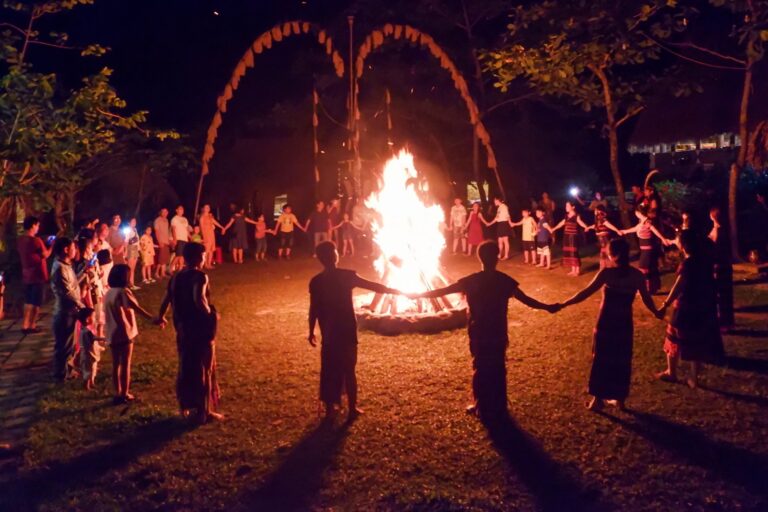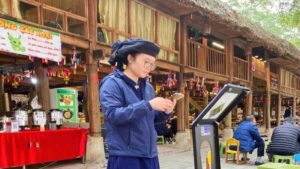Xoan singing from the northern province of Phu Tho has for the first time convinced the United Nations Educational, Scientific and Cultural Organisation’s (UNESCO) to make an unprecedented and exceptional decision to remove this folk music from the UNESCO List of Intangible Cultural Heritage in Need of Urgent Safeguarding to the List of Intangible Cultural Heritage of Humanity.
The decision was announced on December 8, 2017, during UNESCO’s 12th session of the Intergovernmental Committee for the Safeguarding of the Intangible Cultural Heritage, held in South Korea.In November 2011, xoan singing was listed as a cultural heritage in need of urgent safeguarding.In October 2015, Nguyen Dac Thuy, deputy director of Phu Tho Culture, Sports and Tourism Department was sent to France to report to UNESCO on the conservation of this heritage.
His report convinced Cécile Duvelle, Chief of the UNESCO Cultural Heritage Section, who agreed to remove xoan singing from the List of Intangible Cultural Heritage in Need of Urgent Safeguarding, given the good results of conserving this folk singing.“On which list will xoan singing be inscribed then?” Thuy asked Duvelle who had no immediate answer but merely said “it is still a heritage.”Thuy was not satisfied with this answer, making an unprecedented proposal for adding xoan singing to the List of Intangible Cultural Heritage of Humanity.Duvelle promised to take the case of xoan singing to the next Intergovernmental Committee for discussion.In the 10th session of the Intergovernmental Committee for the Safeguarding of the Intangible Cultural Heritage in Namibia in December 2015, regarding the case of xoan singing, UNESCO issued a resolution to deal with the transformation of the heritage.As a result, Phu Tho province’s proposal was accepted and xoan singing was added to the List of Intangible Cultural Heritage of Humanity in December 2017.
Living treasure
Just like xoan singing, folk artist Nguyen Thi Lich is a special case without precedent in the 4000-year history of xoan singing in Phu Tho as she is the first woman head of a xoan singing guild.According to the 4000-year rules of xoan singing guilds, only a man can hold the position of head of the xoan singing guild. The consideration for a woman to hold this honourable position was unprecedented.“The Hung kings gave this mission to Lich,” Vu Ha Hung, an elderly member of An Thai xoan singing guild said.
Lich’s father was folk artist Nguyen Tat Thang, the head of a famous xoan singing guild in Phu Tho, regarded as the ancestral land of the Vietnamese. Before passing away, he put in Lich’s hands a notebook which contained the full 31 ancient xoan songs with his last wish that Lich would conserve and develop the family tradition.It was a tough wish to fulfill for five-year-old Lich at that time but her paternal grandfather taught her how to sing xoan. At the age of 13, Lich was able to perform all the songs in the notebook left by her father.In 1979, little Lich had become a beautiful young woman and opened the first class teaching xoan singing for free. Her classes still exist and Lich has students from all parts of Phu Tho province.Lich’s excellent student, folk artist Nguyen Thi Nga, is the second female head of a xoan singing guild in Phu Tho.Source of masters of the heritageIn 2011 when xoan singing was listed as an intangible cultural heritage in need of urgent safeguarding, Lich was one of only seven folk artists who could perform all the ancient xoan songs.Phu Tho province then launched a program called “protection and development of living treasures” under which the seven folk artists were supposed to maintain the activities of four xoan singing guilds under their charge and teach xoan singing for the succeeding generation of folk artists. “We call them the source of masters of the heritage”, Thuy said.
Over the last four years, every Saturday and Sunday, Lich was not absent for a single xoan singing class, training nearly 70 folk artists who now teach xoan singing like her.Phu Tho now has a regulation on conferring the title of xoan singing artist to motivate and recognize their contribution to the community.
| Legend has it that on the way home after defeating the aggressors, King Hung met buffalo-tending children singing children’s folk songs. The king then taught them songs and dances of the Lac Viet – the people of Van Lang, the kingdom ruled by the Hung Kings. People later built Lai Len Temple in Kim Duc commune of present day Phu Tho as the communal hall of xoan singing. Ancient documents showed that Lai Len Temple was the first theatre of the Vietnamese. |
Developing the heritage in the community
Phu Tho people believe the Hung Kings still follow their descendants to see the latter’s performance of xoan singing – songs of the Lac Viet of Van Lang.
Reviving the heritage
Nguyen Thi Thu, the chairwoman of xoan singing club 5 in Van Phu, Viet Tri, used to know nothing about xoan singing.In 2003, when attending a death anniversary of the Hung Kings at the Hung Kings Temple, Thu watched a xoan singing performance which impressed her very much. “The xoan songs were in my mind all the time,” Thu said.The plan to set up a xoan singing club was formed after Thu learned that the communal hall of the street quarter where she lives is one of the 18 ancient temples worshiping18 Hung Kings, the founders of the legendary kingdom of Van Lang, the predecessor to modern Vietnam.
Thu decided to find a xoan singer who was in that impressive performance to learn xoan singing. That was Nguyen Thi Lich.
After three years of studying with Nguyen Thi Lich, Thu established a xoan singing club which has grown from 10 members initially to 96 with their ages ranging from 5 to over 70.
While clubs like Thu’s are growing fast in the community, xoan singing is also developing in schools with the assistance of the Phu Tho administration.
Kim Duc primary school in Kim Duc commune, Viet Tri city, has a slogan “If one lives in Kim Duc, one should know how to sing xoan.”Vice Principal Han Thi Thu Lan said since 1993, her school included xoan singing in optional music classes and extracurricular activities of learning the local culture.In 2011 when xoan singing was recognised by UNESCO, the school was the first educational institution in Viet Tri to popularize xoan singing by incorporating it into history and geography classes to nurse the students’ love for the cultural traditions of their homeland and the desire for conserving them.A bridge for tourism developmentIn 2015, Phu Tho province made xoan singing a particular tourist product under the provincial plan on tourism development during 2015-2020.According to this plan, visitors to Phu Tho province can enjoy xoan singing performances by folk artists and their guilds either in ancient communal halls or when visiting Phu Tho’s tourist attractions such as Lai Len Temple, Hung Kings Temple and Tam Giang Temple.
Mac Van Vu, a tour guide of the Asian Experience Tourism Company, remembered the feeling of Andren Smith, a Canadian visitor who is a cultural researcher, after watching a xoan singing performance at an ancient communal hall.“With the sounds from only two simple instruments, your artists create plain but harmonious and elegant melodies which are amazingly wonderful to me.”
Story: Thao Vy Photo: Cong Dat – Tat Son
















